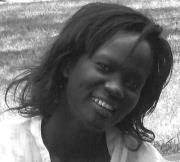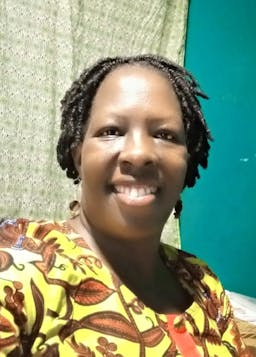Jacquelyne is Living a 'Positive Life' of Inspiration and Spreading Hope
Jan 21, 2015
Story

I recently met Jacquelyne Alesi and I was touched by her articulation and passion for young people living with HIV and AIDs. Jacquelyne is a 26-year-old brilliant woman who is changing lives and giving hope to youths who are HIV positive through counseling and guidance. She is a charismatic, self-possessed, open minded, and full of life; she has learned to love others by loving herself. Jacquelyne’s life changed 9 years ago (when she was 17 years old) when she tested HIV positive.
She is a champion because she has to a greater degree managed to overcome the most difficult situation of living with HIV. i.e. stigma. In an interview with Jacquelyne, she told me that during her teen age she got involved in a sexual relationship with an adult man she thought she ‘knew’. She regrets that she did not know this person. “As a teen I attribute much of this to the inadequate information about sex that I had”. Recalling what happened 9 years ago, she says she was a naïve, with no adequate information about sexuality and growing up.
“I always tell my fellow young people that I was born on 1st May 2003 because this is the day I discovered a new me and I had to look at life from another perspective” she narrated with sincerity. This is the day she made a promise to herself that she will do all it takes to help the young people who have tested HIV positive and those who are open to learning about HIV and how to deal with the situation.
From her expression all through the interview, she is conscious about people around her, respects people but above all wants to be respected too. “Since then, I have been enthusiastic to achieve my dream of giving hope through my life changing experience and change lives”
According to available statistics, youths in Uganda form a significant proportion of the population and yet their potential to national development is often underestimated. The HIV and AIDS in Uganda continues to be a serious public health challenge leading to a disproportionate burden on the population despite efforts to address this pandemic. Young people who constitute a critical segment of the population have are not well engaged in efforts to reduction of HIV and AIDS. The changing trends in the epidemic show significant high rates among this vulnerable and yet key population, with young people aged 15-24 globally accounting for 40% of new HIV infections in 2007. Young people living in Sub-Saharan Africa account for 61% of adult infections. In Uganda, young people account for 1.3% prevalence among males and 3.9% among females. The statistics indicates that there are many young people with the similar story like Jacquelyne in Uganda.
She acknowledges that it is very difficult to deal with stigma. However, she is glad that her family has been very supportive especially her parents and brother who is a medical doctor. Jacquelyne is born to a family of 8 children and is third born).
Worldwide, young people aged 15–24 years accounted for 41% of all new adult HIV infections, and 5 million (4,300,000–5,900,000) young people were living with HIV in 2009(UNAIDS Report on Global AIDS Epidemic, 2010). In Uganda, it is estimated that sexual transmission continues to contribute 76% of new HIV infections with an estimated 55% of new infections among women and girls, while mother to child transmission contributes 22%. Currently, estimates indicate that over 100,000 new infections occur annually (in 2009, an estimated 124,261 new HIV infections occurred countrywide and approximately 66,016 people died from AIDS related illness). There is evidence of trends of apparent reversals in uptake and practice of preventive sexual behavior in the general population, especially among adults and men. It is further reported that 1,192,372 people are living with HIV and AIDS, out of which 60% are women and girls. (Uganda UNGASS report Jan 2008- Dec 2009 and MoH report 2009).
Jacquelyne has since then been very actively involved in working with HIV positive youths. She has a degree in Social Sciences and a diploma in counseling and guidance and works as Programme manager at Uganda Young Positives. Her tasks as a manager are enormous especially programming, counseling, referral, training. UYP trains in aspects such as income generating activities, life skills, entertainment etc.
As a young women living with HIV, Jacquelyne is on antiretroviral therapy (ARVs) and she says that unlike her counterparts in some parts of the country with no access to the ARVs, she easily accesses treatment without any challenges. Her general observation is that the advent of many children and adolescents living with HIV, who initially had a few years of life expectancy are now coming of age and living into their reproductive age. This has seen an increase in the number of young people living with HIV and AIDS. By 2007, 1,200,000 Children (aged 0–17) had been orphaned by AIDS with an estimated 130,000 0-14 years living with HIV and AIDS. Statistics from treatment centers show an increasing number in this vulnerable yet large growing population. The AIDS Support Organization has recorded 5000 young people living with HIV since infancy, with the oldest surviving prenatally infected client turning 23 in 2006. The Pediatric Infectious Disease Clinic (PIDC) in Mulago Hospital in Uganda has over 600 young people living with HIV between the ages of 10-19 years and Mild May Centre is attending to a similar number too. Following the increased number of young people living with HIV and AIDS, it has become imperative to work and support them to adopt and maintain healthier and safer behaviors to reduce risks of re-infection and exposing others to HIV.
Today she has talked to a huge number of youths about HIV and AIDS. Jacquelyne is now married to a very lovely and caring husband and has a child who is HIV negative. “My marriage to my husband is the best thing that has ever happened to me” she says with passion. This is one of the couples who are discordant. I was quite surprised how the couple manages to lead a discordant relationship. With a smile, Jacquelyne acknowledges that is takes the two to support each other and follow medical advice. One of them is to do routine HIV tests which they do every three months, use protection when her viral load is high, attend PMTCT clinic when she is expecting and even abstain when necessary.
As an advocate for young people I asked Jacquelyne what she can say about advice she gives to young people. “One thing I know about young people is that, they will always do what they want to do, however, I tell them that-when, where, what you do and with whom you have a relationship is what matters. In other words, I give them the facts to be able to make an informed choice and decision in regard to their sexual life”




